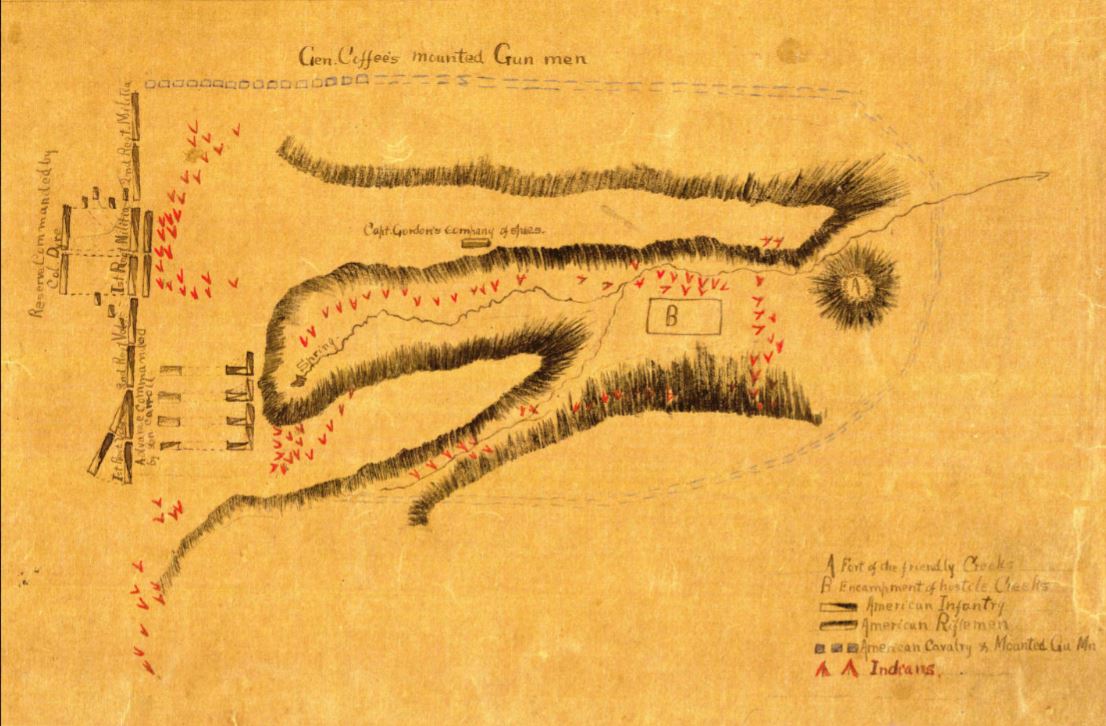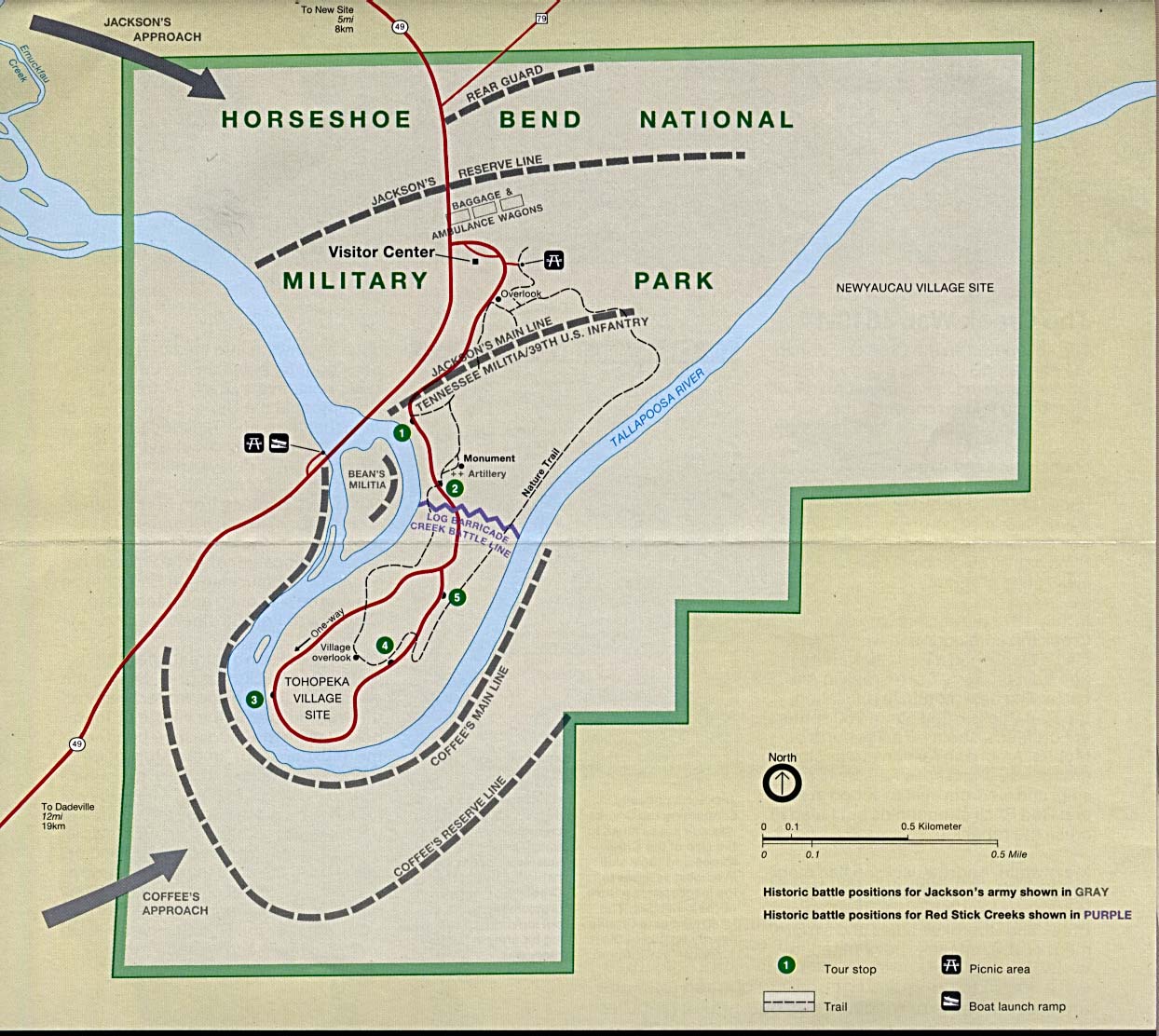|
Fort Leslie
Fort Leslie (also known as Fort Lashley or Fort Talladega) was a stockade fort built in present-day Talladega County, Alabama in 1813 during the Creek War. After the Creek War began, protective stockades were built by settlers and Creeks who were allied with the United States to protect themselves from hostile Creek attacks. Fort Leslie was the focal point of the Battle of Talladega but was soon abandoned after the end of the Creek War. History Background The Creek War began after various factions of the Creek tribe opposed the United States and other allied tribes, including some Creeks (the Creeks who supported the United States were known as White Sticks). The Creeks who were hostile to the United States were known as Red Sticks and were angered over the centralization of tribal government. The White Sticks and Red Sticks were engaged in a civil war prior to United States involvement. Once the War of 1812 The War of 1812 (18 June 1812 – 17 February 1815) was fought by th ... [...More Info...] [...Related Items...] OR: [Wikipedia] [Google] [Baidu] |
Talladega, Alabama
Talladega (, also ) is the county seat of Talladega County, Alabama, United States. It was incorporated in 1835. At the 2020 census, the population was 15,861. Talladega is approximately east of one of the state’s biggest cities, Birmingham. The city is home to the Alabama Institute for the Deaf and Blind and the Talladega Municipal Airport, a public general aviation airport. The Talladega Superspeedway, Talladega College and the International Motorsports Hall of Fame are located nearby. The First National Bank of Talladega (now First Bank of Alabama) is the oldest bank in the State of Alabama, being founded in 1848. Etymology The name Talladega is derived from a Muscogee language, a Native American language of the Muscogee. It comes from the word ''Tvlvtēke'', from Muscogee ''tvlwv'', meaning "town", and ''vtēke'', meaning "border", indicating its location on the border between Muscogee and Natchez. Geography Talladega is located in east central Alabama at 33° 26� ... [...More Info...] [...Related Items...] OR: [Wikipedia] [Google] [Baidu] |
Alexander McGillivray
Alexander McGillivray, also known as ''Hoboi-Hili-Miko'' (December 15, 1750February 17, 1793), was a Muscogee (Creek) leader. The son of a Muscogee mother and a Scottish father, he had skills no other Creek of his day had: he was not only literate but educated, and he knew the "white" world and merchandise trading well. These gave him prestige, especially with European-Americans, who were glad to finally find a Creek leader they could talk to and deal with. (Prior to contact with Europeans, the Creek did not have leaders or rulers in the European sense.) He used his role as link between the two worlds to his advantage, not always fairly, and became the richest Creek of his time. McGillivray was literate and his "voluminous" correspondence has survived. In many cases his letters are the only source for events in his life, and they naturally present him in a very good light. Recent historians have taken issue with the heroic status he had in earlier histories. McGillivray's statu ... [...More Info...] [...Related Items...] OR: [Wikipedia] [Google] [Baidu] |
Fort Jackson (Alabama)
Fort Toulouse and Fort Jackson are two forts that shared the same site at the fork of the Coosa River and the Tallapoosa River, near Wetumpka, Alabama. Fort Toulouse Fort Toulouse (Muscogee: Franca choka chula), also called Fort des Alibamons and Fort Toulouse des Alibamons, is a historic fort near the city of Wetumpka, Alabama, United States, that is now maintained by the Alabama Historical Commission. The French founded the fort in 1717, naming it for Louis-Alexandre de Bourbon, comte de Toulouse. In order to counter the growing influence of the British colonies of Georgia and Carolina, the government of French Louisiana erected a fort on the eastern border of the Louisiana Colony in what is now the state of Alabama. The fort was also referred to as the Post of the Alabama, named after the Alabama tribe of Upper Creek Indians, who resided just below the confluence of the Coosa and Tallapoosa rivers on the upper reaches of the Alabama River. The number of troops in garriso ... [...More Info...] [...Related Items...] OR: [Wikipedia] [Google] [Baidu] |
Fort Williams (Alabama)
Fort Williams was a supply depot built in early 1814 in preparation for the Battle of Horseshoe Bend. It was located in Alabama on the southeast shore where Cedar Creek meets the Coosa River, near Talladega Springs. History Creek War During the Creek War (part of the larger War of 1812), General Andrew Jackson dispatched Colonel John Williams and the 39th Infantry Regiment from Fort Strother. The regiment brought supplies to the area where Fort Williams would be built and were met there by Jackson. A fort was erected at this site under the direction of topographical engineer Howell Tatum on March 22, 1814 and named for Colonel Williams. The supplies were originally transported down the Coosa River from Fort Armstrong prior to arriving at Fort Strother. The site of Fort Williams was chosen as it was equidistant from Fort Strother to Holy Ground. The majority of Jackson's forces were garrisoned at Fort Williams prior to the Battle of Horseshoe Bend, and blazed a 52-mile trail ... [...More Info...] [...Related Items...] OR: [Wikipedia] [Google] [Baidu] |
United States House Committee On Interior And Insular Affairs
United may refer to: Places * United, Pennsylvania, an unincorporated community * United, West Virginia, an unincorporated community Arts and entertainment Films * ''United'' (2003 film), a Norwegian film * ''United'' (2011 film), a BBC Two film Literature * ''United!'' (novel), a 1973 children's novel by Michael Hardcastle Music * United (band), Japanese thrash metal band formed in 1981 Albums * ''United'' (Commodores album), 1986 * ''United'' (Dream Evil album), 2006 * ''United'' (Marvin Gaye and Tammi Terrell album), 1967 * ''United'' (Marian Gold album), 1996 * ''United'' (Phoenix album), 2000 * ''United'' (Woody Shaw album), 1981 Songs * "United" (Judas Priest song), 1980 * "United" (Prince Ital Joe and Marky Mark song), 1994 * "United" (Robbie Williams song), 2000 * "United", a song by Danish duo Nik & Jay featuring Lisa Rowe Television * ''United'' (TV series), a 1990 BBC Two documentary series * ''United!'', a soap opera that aired on BBC One from 1965-19 ... [...More Info...] [...Related Items...] OR: [Wikipedia] [Google] [Baidu] |
Huntsville, Alabama
Huntsville is a city in Madison County, Limestone County, and Morgan County, Alabama, United States. It is the county seat of Madison County. Located in the Appalachian region of northern Alabama, Huntsville is the most populous city in the state. Huntsville was founded within the Mississippi Territory in 1805 and became an incorporated town in 1811. When Alabama was admitted as a state in 1819, Huntsville was designated for a year as the first capital, before that was moved to more central settlements. The city developed across nearby hills north of the Tennessee River, adding textile mills in the late nineteenth century. Its major growth has taken place since World War II. During the war, the Army established Redstone Arsenal near here with a chemical weapons plant, and nearby related facilities. After the war, additional research was conducted at Redstone Arsenal on rockets, followed by adaptations for space exploration. NASA's Marshall Space Flight Center, the Unit ... [...More Info...] [...Related Items...] OR: [Wikipedia] [Google] [Baidu] |
Battle Of Horseshoe Bend
The Battle of Horseshoe Bend (also known as ''Tohopeka'', ''Cholocco Litabixbee'', or ''The Horseshoe''), was fought during the War of 1812 in the Mississippi Territory, now central Alabama. On March 27, 1814, United States forces and Indian allies under Major General Andrew Jackson defeated the Red Sticks, a part of the Creek Indian tribe who opposed American expansion, effectively ending the Creek War. Background The Creek Indians of Georgia and the eastern part of the Mississippi Territory had become divided into two factions: the Upper Creek (or Red Sticks), a majority who opposed American expansion and sided with the British and the colonial authorities of Spanish Florida during the War of 1812; and the Lower Creek, who were more assimilated into the Anglo culture, had a stronger relationship with the U.S. Indian Agent Benjamin Hawkins, and sought to remain on good terms with the Americans. The Shawnee war leader Tecumseh visited Creek and other Southeast Indian towns i ... [...More Info...] [...Related Items...] OR: [Wikipedia] [Google] [Baidu] |
Davy Crockett
David Crockett (August 17, 1786 – March 6, 1836) was an American folk hero, frontiersman, soldier, and politician. He is often referred to in popular culture as the "King of the Wild Frontier". He represented Tennessee in the U.S. House of Representatives and served in the Texas Revolution. Crockett grew up in East Tennessee, where he gained a reputation for hunting and storytelling. He was made a colonel in the militia of Lawrence County, Tennessee and was elected to the Tennessee state legislature in 1821. In 1827, he was elected to the U.S. Congress where he vehemently opposed many of the policies of President Andrew Jackson, especially the Indian Removal Act. Crockett's opposition to Jackson's policies led to his defeat in the 1831 elections. He was re-elected in 1833, then narrowly lost in 1835, prompting his angry departure to Texas (then the Mexican state of Tejas) shortly thereafter. In early 1836, he took part in the Texas Revolution and died at the Battle of the ... [...More Info...] [...Related Items...] OR: [Wikipedia] [Google] [Baidu] |
Thomas Simpson Woodward
Thomas Simpson Woodward (February 22, 1797 – 1859) was a U.S. Army general who settled and named the area that developed into Tuskegee, Alabama. Late in life, he wrote letters about his experiences with and beliefs about American Indians. Woodward was born in Elbert County, Georgia around 1794 and was orphaned at a young age. He was raised by his mother and her brother. He became a brigadier general in the Georgia militia and fought alongside Creek Indians. He migrated west and established a plantation in Camden, Arkansas, a town he named. He later moved to Wheeling in Winn Parish, Louisiana and established a 16,000-acre plantation, which he named Montgomery after the capital city of Alabama. With James Dent he plotted land he owned and named it Tuskegee. A collection of his letters was published in 1859 as ''Woodward's Reminiscences of the Creek, or Muscogee Indians, Contained in Letters to Friends in Georgia and Alabama'', in Montgomery, Alabama. According to an intro ... [...More Info...] [...Related Items...] OR: [Wikipedia] [Google] [Baidu] |
Feral Pig
The feral pig is a domestic pig which has gone feral, meaning it lives in the wild. They are found mostly in the Americas and Australia. Razorback and wild hog are Americanisms applied to feral pigs or boar-pig hybrids. Definition A feral pig is a domestic pig that has escaped or been released into the wild, and is living more or less as a wild animal, or one that is descended from such animals. Zoologists generally exclude from the ''feral'' category animals that, although captive, were genuinely wild before they escaped. Accordingly, Eurasian wild boar, released or escaped into habitats where they are not native, such as in North America, are not generally considered feral, although they may interbreed with feral pigs. Likewise, reintroduced wild boars in Western Europe are also not considered feral, despite the fact that they were raised in captivity prior to their release. In the New World North America Domestic pigs were first introduced to the Americas in the 16th cen ... [...More Info...] [...Related Items...] OR: [Wikipedia] [Google] [Baidu] |
Natchez People
The Natchez (; Natchez pronunciation ) are a Native American people who originally lived in the Natchez Bluffs area in the Lower Mississippi Valley, near the present-day city of Natchez, Mississippi in the United States. They spoke a language with no known close relatives, although it may be very distantly related to the Muskogean languages of the Creek Confederacy.Geoffrey Kimball, "Natchez" in ''Native Languages of the Southeastern United States'', ed. Janine Scancarelli and Heath ... [...More Info...] [...Related Items...] OR: [Wikipedia] [Google] [Baidu] |




